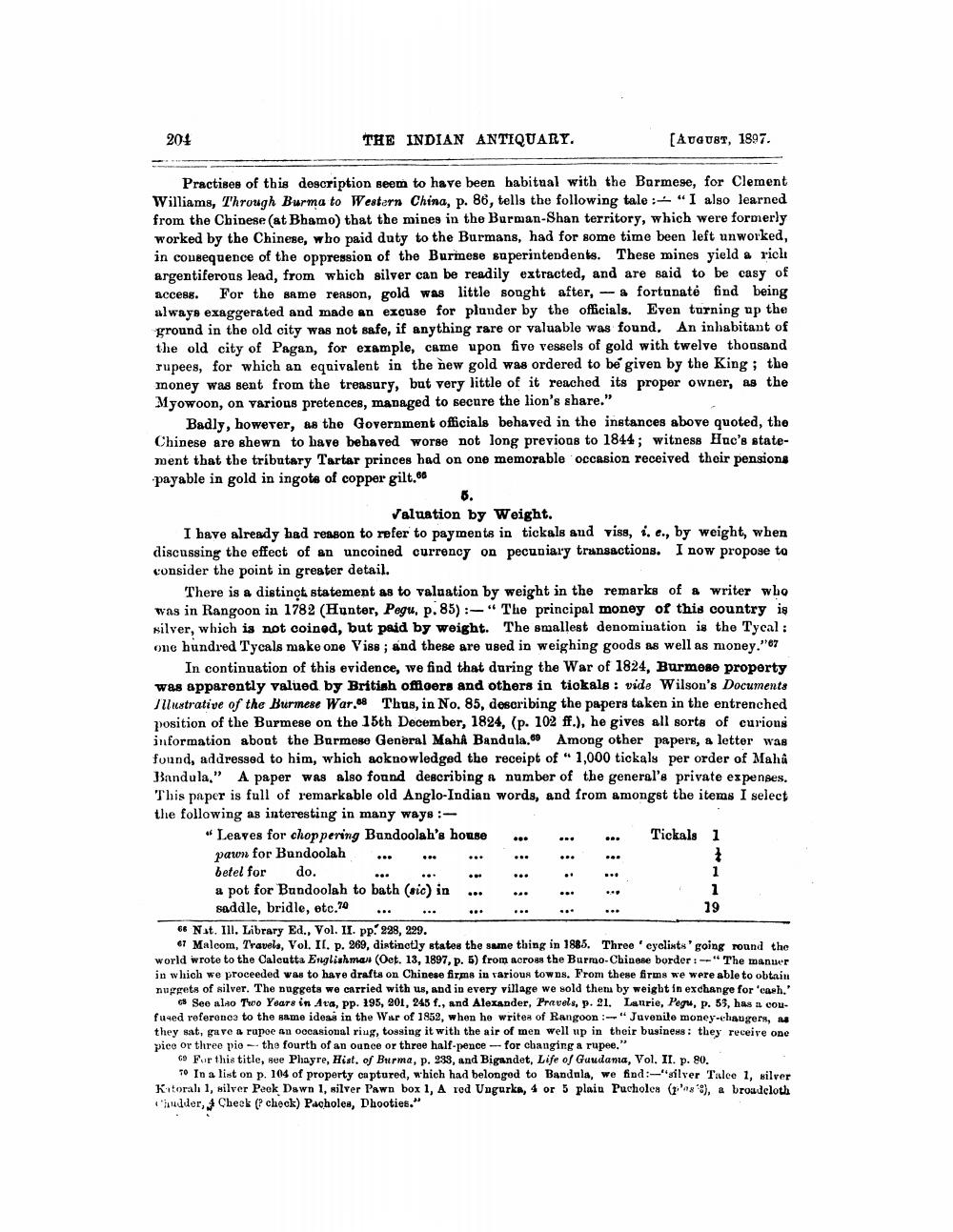________________
204
THE INDIAN ANTIQUARY.
Practises of this description seem to have been habitual with the Burmese, for Clement Williams, Through Burma to Western China, p. 86, tells the following tale: "I also learned from the Chinese (at Bhamo) that the mines in the Burman-Shan territory, which were formerly worked by the Chinese, who paid duty to the Burmans, had for some time been left unworked, in consequence of the oppression of the Burmese superintendents. These mines yield a rich argentiferous lead, from which silver can be readily extracted, and are said to be casy of access. For the same reason, gold was little sought after, - a fortunaté find being always exaggerated and made an excuse for plunder by the officials. Even turning up the ground in the old city was not safe, if anything rare or valuable was found. An inhabitant of the old city of Pagan, for example, came upon five vessels of gold with twelve thousand rupees, for which an equivalent in the new gold was ordered to be given by the King; the money was sent from the treasury, but very little of it reached its proper owner, as the Myowoon, on various pretences, managed to secure the lion's share."
-
[AUGUST, 1897.
Badly, however, as the Government officials behaved in the instances above quoted, the Chinese are shewn to have behaved worse not long previous to 1844; witness Huc's statement that the tributary Tartar princes had on one memorable occasion received their pensions payable in gold in ingots of copper gilt,65
5.
Valuation by Weight.
I have already had reason to refer to payments in tickals and viss, i. e., by weight, when discussing the effect of an uncoined currency on pecuniary transactions. I now propose to consider the point in greater detail.
There is a distinct statement as to valuation by weight in the remarks of a writer who was in Rangoon in 1782 (Hunter, Pegu, p. 85):-"The principal money of this country is silver, which is not coined, but paid by weight. The smallest denomination is the Tycal: one hundred Tycals make one Viss; and these are used in weighing goods as well as money."67
In continuation of this evidence, we find that during the War of 1824, Burmese property was apparently valued by British officers and others in tickals: vide Wilson's Documents Illustrative of the Burmese War. Thus, in No. 85, describing the papers taken in the entrenched position of the Burmese on the 15th December, 1824, (p. 102 ff.), he gives all sorts of curious information about the Burmese General Mahi Bandula. Among other papers, a letter was found, addressed to him, which acknowledged the receipt of "1,000 tickals per order of Maha Bandula." A paper was also found describing a number of the general's private expenses. This paper is full of remarkable old Anglo-Indian words, and from amongst the items I select the following as interesting in many ways:
"Leaves for choppering Bundoolah's house
pawn for Bundoolah betel for
do.
a pot for Bundoolah to bath (sic) in saddle, bridle, etc.70
www
Tickals 1
}
1
1
19
66 Nat. Ill. Library Ed., Vol. II. pp. 228, 229.
67 Malcom, Travels, Vol. II. p. 269, distinctly states the same thing in 1885. Three cyclists' going round the world wrote to the Calcutta Englishman (Oct. 13, 1897, p. 5) from across the Burmo-Chinese border:-"The manuer in which we proceeded was to have drafts on Chinese firms in various towns. From these firms we were able to obtain nuggets of silver. The nuggets we carried with us, and in every village we sold them by weight in exchange for 'cash."
cs See also Two Years in Ava, pp. 195, 201, 245 f., and Alexander, Pravels, p. 21. Laurie, Pegu, p. 55, has a coufused reference to the same ideas in the War of 1852, when he writes of Rangoon :-" Juvenile money-changers, as they sat, gave a rupee an occasional ring, tossing it with the air of men well up in their business: they receive one pice or three pie the fourth of an ounce or three half-pence for changing a rupee."
69 For this title, see Phayre, Hist. of Burma, p. 233, and Bigandet, Life of Guudama, Vol. II. p. 80.
10 In a list on p. 104 of property captured, which had belonged to Bandula, we find:-"silver Talce 1, silver Kitorah 1, silver Peek Dawn 1, silver Pawn box 1, A red Ungurka, 4 or 5 plain Pucholes (p's), a broadcloth hudder, Check (? check) Pacholes, Dhooties."




